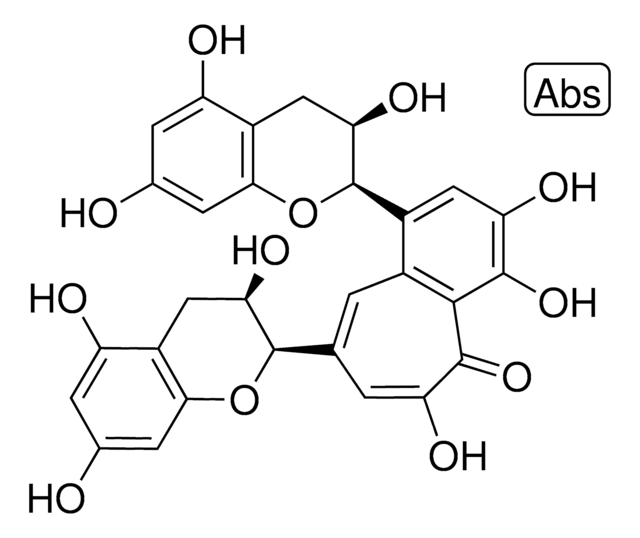About This Item
Recommended Products
grade
analytical standard
Quality Level
description
Mixture of Theaflavin 3-gallate and Theaflavin 3′-gallate
assay
≥80% (HPLC)
technique(s)
HPLC: suitable
gas chromatography (GC): suitable
application(s)
food and beverages
format
neat
storage temp.
−20°C
InChI
1S/C36H28O16/c37-14-5-20(39)18-10-25(44)33(50-28(18)7-14)12-1-16-17(34-26(45)11-19-21(40)6-15(38)8-29(19)51-34)9-27(46)35(30(16)32(48)24(43)2-12)52-36(49)13-3-22(41)31(47)23(42)4-13/h1-9,25-26,33-34,37-42,44-47H,10-11H2,(H,43,48)/t25-,26?,33-,34?/m1/s1
InChI key
CKDOBTPKUHSESZ-MALJIYBWSA-N
General description
Application
Packaging
Storage Class
11 - Combustible Solids
wgk_germany
WGK 3
flash_point_f
Not applicable
flash_point_c
Not applicable
ppe
Eyeshields, Gloves, type N95 (US)
Choose from one of the most recent versions:
Certificates of Analysis (COA)
Don't see the Right Version?
If you require a particular version, you can look up a specific certificate by the Lot or Batch number.
Already Own This Product?
Find documentation for the products that you have recently purchased in the Document Library.
Active Filters
Our team of scientists has experience in all areas of research including Life Science, Material Science, Chemical Synthesis, Chromatography, Analytical and many others.
Contact Technical Service





